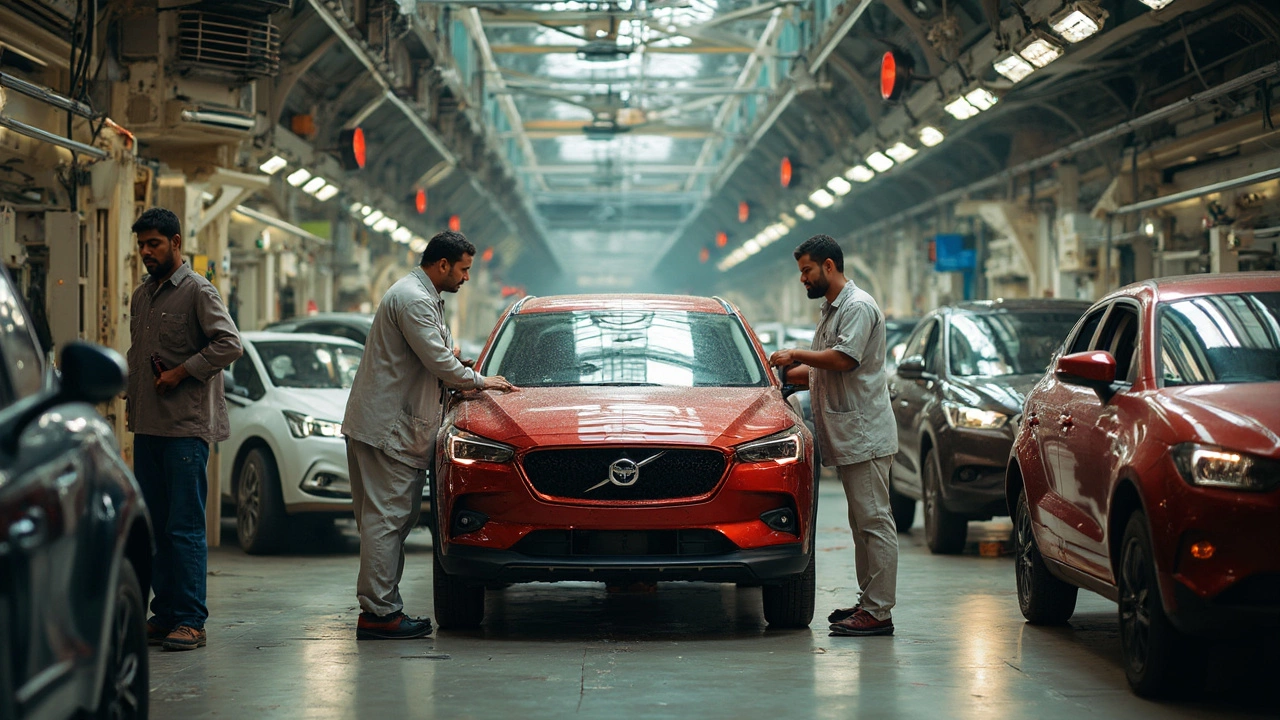Top Car Manufacturer in India: Who Holds the Crown?

When it comes to car manufacturing in India, the stakes are high and the competition fierce. In recent years, one name consistently stands out from the rest: Maruti Suzuki. Known for producing affordable and reliable vehicles, they have carved a niche that caters perfectly to Indian consumers. But how did they get there, and what keeps them on top?
India's car market isn't just about volume; it's also about understanding the unique needs of the Indian driver. Affordability, fuel efficiency, and durability are key, and Maruti Suzuki seems to have perfected the formula. They've also embraced innovation, offering everything from compact hatchbacks to snazzy sedans packed with the latest tech.
Now, you might be wondering, what about the other big players like Hyundai or Tata? Well, they've made impressive strides too. Yet, Maruti Suzuki's unwavering focus on customer satisfaction and strategic pricing continues to give them an edge. It's not just the cars themselves driving their success—it's the entire experience they offer.
So, what's next for the Indian automotive giant? With electric vehicles gaining traction and consumer preferences shifting, all eyes will be on how they adapt and evolve. Whether you're a potential buyer or just an auto enthusiast, understanding these dynamics can give you a front-row seat to the fascinating world of India's car manufacturing.
India's Automotive Landscape
India's automobile industry stands as a powerhouse in the global market. Ranking as the fourth largest globally by volume, it continues to grow with remarkable vigor. With a broad spectrum of cars ranging from hatchbacks to luxurious SUVs, the options for consumers are endless.
But it's not just about the variety. The industry has evolved significantly, driven by the changing needs and aspirations of the Indian middle class. Affordability and efficiency remain crucial, but features and aesthetics are becoming increasingly important.
Economic Contributors
The auto industry is a significant contributor to the Indian economy, accounting for about 7.1% of the GDP. Apart from producing vehicles, it creates numerous job opportunities, with direct employment for over 35 million people. There's a ripple effect across sectors such as steel, paint, tires, and IT services.
Government's Push for Growth
Recognizing the potential, the government has played an active role in boosting the industry. Initiatives like the Automotive Mission Plan and Make in India aim to turn India into a manufacturing hub. The focus is on boosting exports and production to meet ambitious goals.
Challenges on the Road
Despite its successes, the industry faces challenges. Infrastructure issues like traffic congestion and pollution remain pressing concerns. Moreover, the volatile nature of fuel prices and regulatory changes around safety and emissions require constant adaptation from manufacturers.
One interesting development is the push towards electric vehicles (EVs). The move is partly to counter pollution and partly to align with global trends. India aims to achieve 30% EV sales by 2030, and various subsidies and initiatives are gradually making this vision a reality.
| Year | Car Sales (millions) |
|---|---|
| 2020 | 2.7 |
| 2021 | 3.1 |
| 2022 | 3.5 |
The journey of India's car manufacturing sector is far from over. As it navigates these challenges, with innovations in vehicle production and technology, the potential is immense for creating a sustainable and thriving industry.
Leading Manufacturer Revealed
So, who's the star of the car manufacturing India scene? No surprises here—it's Maruti Suzuki. Dominating the Indian automotive landscape for decades, they hold around 47% market share, a figure that speaks for itself. But how did they reach this commanding position, and what's keeping them ahead in such a competitive field?
The Journey to the Top
Maruti Suzuki's journey began in the early 1980s, and by the mid-80s, they had launched the Maruti 800. This affordable compact car became an instant hit, quickly becoming a household name. It set the stage for the company's growth as it resonated perfectly with the needs of Indian consumers—offering reliability, efficiency, and value for money.
Why They Stand Out
One major factor is their extensive network. With over 3,000 dealerships across India, they ensure a reach that few can match. Plus, their service centers are nearly as numerous, reinforcing their commitment to customer satisfaction.
Their product line covers almost all bases, from the budget-friendly Alto to the stylish Baleno and the versatile Ertiga, catering to a wide range of customer preferences. They've nailed the art of balancing affordability with the latest features, a tricky feat that they manage exceptionally well.
Embracing Change
Maruti Suzuki isn't resting on its laurels; they're keenly aware of the shifting tides towards sustainability. They're making significant strides in the electric vehicle (EV) segment, promising to keep their lead even in the changing landscape of India automobile industry.
But it's not just the products and services that keep them afloat. Their knack for capturing local tastes and a habit of listening to their customers have cemented a fiercely loyal customer base.
In summary, Maruti Suzuki holds the crown for good reasons. Their combination of product diversity, strategic pricing, and excellent after-sales service places them squarely at the top in the world of vehicle production leader. And with eyes firmly set on the future, they're not planning to give up the throne anytime soon.

Success Factors
What keeps Maruti Suzuki at the pinnacle of car manufacturing in India? Let's dive into the keys to their success.
Understanding the Market
First off, Maruti Suzuki has nailed what Indian consumers want. They aren't just selling cars—they're offering solutions. Vehicles that are both affordable and efficient hit home with the masses. From creating small hatchbacks to more premium range cars, they ensure there's something for everyone.
Impressive Network
Another factor is their massive network. With an extensive sales and service network spanning across every nook and cranny of India, Maruti Suzuki ensures their cars are always in reach. This accessibility is a big deal, especially in a country with such diverse geography.
Value for Money
Maruti Suzuki's focus on providing value can't be overstated. They offer top-notch features at a price that's friendly on the wallet. Why spend more when you can get quality for less? This strategy wins over both first-time buyers and seasoned drivers looking for their next upgrade.
Innovative Financing
The company doesn't stop at making affordable cars; they make owning one easy too. Their user-friendly financing options and attractive exchange bonuses lower the barrier for many potential buyers.
Embracing Technology
In a tech-savvy world, staying relevant means embracing change. Maruti Suzuki is always up-to-date with the latest in-auto technology, ensuring their cars aren't just efficient but smart too. Features like automated safety systems and modern infotainment can be seen across various models.
However, it's not just the cars they innovate but the way they produce them. They focus on locally sourced parts which reduces costs and aligns well with governmental initiatives like 'Make in India'.
| Year | Market Share (%) |
|---|---|
| 2021 | 45% |
| 2022 | 47% |
| 2023 | 48% |
These factors combined explain why Maruti Suzuki has maintained such a lead in the Indian automobile landscape. They adapt not just to trends, but to the voices of their customers, ensuring they're always a step ahead in the race.
Future Prospects
Looking ahead, the Indian car manufacturing industry, primarily led by Maruti Suzuki, is gearing up for some exciting times. As the world shifts toward greener alternatives, electric vehicles (EVs) are becoming the buzzword in the industry. But how does this translate to India, where affordability often dictates purchasing decisions?
Electric Vehicles: The Next Big Thing
Maruti Suzuki has already announced plans to dip its toes into the EV market by 2025. They're aiming to balance affordability with cutting-edge technology, a move that could redefine India's automobile industry. Although electric car sales currently make up a small slice of the market, the potential for growth is massive.
Here's a table highlighting predicted EV sales growth in India over the next few years:
| Year | Projected EV Sales (in Thousands) |
|---|---|
| 2025 | 500 |
| 2026 | 700 |
| 2027 | 1000 |
Adapting to Consumer Needs
With this evolving landscape, car manufacturers in India need to stay agile. Preferences are shifting, with more consumers looking for sustainability without compromising on practicality. Companies must focus on developing infrastructure for EVs, like charging stations, to make adoption smoother.
Vehicle production leader, Maruti Suzuki, plans to expand its footprint by rolling out hybrid models. They recognize the transitional phase buyers might be in, offering options that merge traditional fuel efficiency with electric capabilities.
Government Initiatives and Support
The Indian government is also playing a big role. They've been pushing policies that encourage the production and usage of electric vehicles. Incentives such as tax breaks and exemptions make it more appealing for both manufacturers and consumers alike.
In summary, the future of car manufacturing in India is full of potential and challenges. The focus on technology and sustainability will likely determine who leads the pack in the coming years. For anyone interested in this sector, keeping an eye on how these changes unfold offers insights not only into the industry but the country's economic growth trajectory as well.